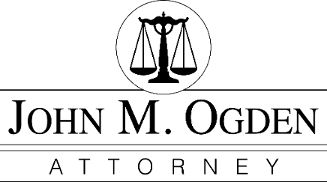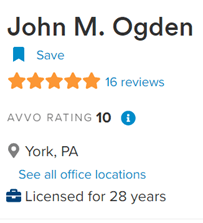Your Zoning Lawyer in York, PA.
Attorney Ogden has been practicing zoning law since 1993. He has handled
cases from special exceptions, variances, and interpretations of the zoning
officer’s decision to deny a permit or application.
Attorney Ogden has a winning track record in court with very difficult cases. John M. Ogden successfully battled one of the largest corporations in the World, Wal--Mart™, over its proposed superstore planned for Cape Horn Road in Windsor Township because it failed to meet the reasonable requirements of the Zoning Ordinance. Citizens for Responsible Dev.-Windsor Twp., Inc. v. Windsor Twp. Zoning Hearing Board. 917 A.2d 918 (Pa. Commw. Ct. 2007).
Attorney Ogden has a winning track record in court with very difficult cases. John M. Ogden successfully battled one of the largest corporations in the World, Wal--Mart™, over its proposed superstore planned for Cape Horn Road in Windsor Township because it failed to meet the reasonable requirements of the Zoning Ordinance. Citizens for Responsible Dev.-Windsor Twp., Inc. v. Windsor Twp. Zoning Hearing Board. 917 A.2d 918 (Pa. Commw. Ct. 2007).

Attorney Ogden represented a real estate developer whose plan was denied based on a lack of a sewer plan. The developer came to Attorney Ogden who reviewed the denial and found that it did not meet legal requirements. Attorney Ogden filed for a “deemed decision” and was successful in the trial court and in the Commonwealth Court. David Lease v. Hamilton Twp., 885 A.2d 684 (Pa.Commw. Ct. 2005).
Zoning Hearing Board Variance
Below
is the statute that sets forth the criteria for obtaining a variance from a
Zoning Hearing Board:
53 P.S. § 10910.2
§ 10910.2. Zoning Hearing Board's functions; variances
(a) The board shall hear requests for variances where it is alleged that the provisions of the zoning ordinance inflict unnecessary hardship upon the applicant. The board may by rule prescribe the form of application and may require preliminary application to the zoning officer. The board may grant a variance, provided that all of the following findings are made where relevant in a given case:
(1) That there are unique physical circumstances or conditions, including irregularity, narrowness, or shallowness of lot size or shape, or exceptional topographical or other physical conditions peculiar to the particular property and that the unnecessary hardship is due to such conditions and not the circumstances or conditions generally created by the provisions of the zoning ordinance in the neighborhood or district in which the property is located.
(2) That because of such physical circumstances or conditions, there is no possibility that the property can be developed in strict conformity with the provisions of the zoning ordinance and that the authorization of a variance is therefore necessary to enable the reasonable use of the property.
(3) That such unnecessary hardship has not been created by the appellant.
(4) That the variance, if authorized, will not alter the essential character of the neighborhood or district in which the property is located, nor substantially or permanently impair the appropriate use or development of adjacent property, nor be detrimental to the public welfare.
(5) That the variance, if authorized, will represent the minimum variance that will afford relief and will represent the least modification possible of the regulation in issue.
(b) In granting any variance, the board may attach such reasonable conditions and safeguards as it may deem necessary to implement the purposes of this act and the zoning ordinance.
53 P.S. § 10910.2
§ 10910.2. Zoning Hearing Board's functions; variances
(a) The board shall hear requests for variances where it is alleged that the provisions of the zoning ordinance inflict unnecessary hardship upon the applicant. The board may by rule prescribe the form of application and may require preliminary application to the zoning officer. The board may grant a variance, provided that all of the following findings are made where relevant in a given case:
(1) That there are unique physical circumstances or conditions, including irregularity, narrowness, or shallowness of lot size or shape, or exceptional topographical or other physical conditions peculiar to the particular property and that the unnecessary hardship is due to such conditions and not the circumstances or conditions generally created by the provisions of the zoning ordinance in the neighborhood or district in which the property is located.
(2) That because of such physical circumstances or conditions, there is no possibility that the property can be developed in strict conformity with the provisions of the zoning ordinance and that the authorization of a variance is therefore necessary to enable the reasonable use of the property.
(3) That such unnecessary hardship has not been created by the appellant.
(4) That the variance, if authorized, will not alter the essential character of the neighborhood or district in which the property is located, nor substantially or permanently impair the appropriate use or development of adjacent property, nor be detrimental to the public welfare.
(5) That the variance, if authorized, will represent the minimum variance that will afford relief and will represent the least modification possible of the regulation in issue.
(b) In granting any variance, the board may attach such reasonable conditions and safeguards as it may deem necessary to implement the purposes of this act and the zoning ordinance.
Zoning Hearing Board Special Exception
Below
is the statute that sets forth the criteria for obtaining a Special Exception
from a Zoning Hearing Board:
53 P.S. § 10912.1
§ 10912.1. Zoning Hearing Board's functions; special exception
Where the governing body, in the zoning ordinance, has stated special exceptions to be granted or denied by the board pursuant to express standards and criteria, the board shall hear and decide requests for such special exceptions in accordance with such standards and criteria. In granting a special exception, the board may attach such reasonable conditions and safeguards, in addition to those expressed in the ordinance, as it may deem necessary to implement the purposes of this act and the zoning ordinance.
Municipalities have specific criteria for different types of uses. For example, each municipal ordinance has several categories such as: gas stations, truck terminals, used car lots, animal shelters, nurseries, etc.
If the applicant meets all criteria, then the Board must grant the Special Exception. The name is a misnomer as the board doesn’t really grant an exception and there is nothing special about it.
53 P.S. § 10912.1
§ 10912.1. Zoning Hearing Board's functions; special exception
Where the governing body, in the zoning ordinance, has stated special exceptions to be granted or denied by the board pursuant to express standards and criteria, the board shall hear and decide requests for such special exceptions in accordance with such standards and criteria. In granting a special exception, the board may attach such reasonable conditions and safeguards, in addition to those expressed in the ordinance, as it may deem necessary to implement the purposes of this act and the zoning ordinance.
Municipalities have specific criteria for different types of uses. For example, each municipal ordinance has several categories such as: gas stations, truck terminals, used car lots, animal shelters, nurseries, etc.
If the applicant meets all criteria, then the Board must grant the Special Exception. The name is a misnomer as the board doesn’t really grant an exception and there is nothing special about it.
Zoning Board Conditional Use
Below is the statute that sets forth the
criteria for obtaining a Conditional Use from a Zoning Hearing Board:
53 P.S. § 10913.2
§ 10913.2. Governing body's functions; conditional uses
(a) Where the governing body, in the zoning ordinances, has stated conditional uses to be granted or denied by the governing body pursuant to express standards and criteria, the governing body shall hold hearings on and decide requests for such conditional uses in accordance with such standards and criteria. The hearing shall be conducted by the board or the board may appoint any member or an independent attorney as a hearing officer. The decision or, where no decision is called for, the findings shall be made by the board. However, the appellant or the applicant, as the case may be, in addition to the municipality may, prior to the decision of the hearing, waive decision or findings by the board and accept the decision or findings of the hearing officer as final. In granting a conditional use, the governing body may attach such reasonable conditions and safeguards, in addition to those expressed in the ordinance, as it may deem necessary to implement the purposes of this act in the zoning ordinance.
(b)(1) The governing body shall render a written decision or, when no decision is called for, make written findings on the conditional use application within 45 days after the last hearing before the governing body. Where the application is contested or denied, each decision shall be accompanied by findings of fact or conclusions based thereon, together with any reasons therefor. Conclusions based on any provisions of this act or of any ordinance, rule or regulation shall contain a reference to the provision relied on and the reasons why the conclusion is deemed appropriate in the light of the facts found.
(2) Where the governing body fails to render the decision within the period required by this subsection or fails to commence, conduct or complete the required hearing as provided in section 908(1.2),1 the decision shall be deemed to have been rendered in favor of the applicant unless the applicant has agreed in writing or on the record to an extension of time. When a decision has been rendered in favor of the applicant because of the failure of the governing body to meet or render a decision as hereinabove provided, the governing body shall give public notice of the decision within ten days from the last day it could have met to render a decision in the same manner as required by the public notice requirements of this act. If the governing body shall fail to provide such notice, the applicant may do so.
(3) Nothing in this subsection shall prejudice the right of any party opposing the application to appeal the decision to a court of competent jurisdiction. A copy of the final decision or, where no decision is called for, of the findings shall be delivered to the applicant personally or mailed to him no later than the day following its date.
53 P.S. § 10913.2
§ 10913.2. Governing body's functions; conditional uses
(a) Where the governing body, in the zoning ordinances, has stated conditional uses to be granted or denied by the governing body pursuant to express standards and criteria, the governing body shall hold hearings on and decide requests for such conditional uses in accordance with such standards and criteria. The hearing shall be conducted by the board or the board may appoint any member or an independent attorney as a hearing officer. The decision or, where no decision is called for, the findings shall be made by the board. However, the appellant or the applicant, as the case may be, in addition to the municipality may, prior to the decision of the hearing, waive decision or findings by the board and accept the decision or findings of the hearing officer as final. In granting a conditional use, the governing body may attach such reasonable conditions and safeguards, in addition to those expressed in the ordinance, as it may deem necessary to implement the purposes of this act in the zoning ordinance.
(b)(1) The governing body shall render a written decision or, when no decision is called for, make written findings on the conditional use application within 45 days after the last hearing before the governing body. Where the application is contested or denied, each decision shall be accompanied by findings of fact or conclusions based thereon, together with any reasons therefor. Conclusions based on any provisions of this act or of any ordinance, rule or regulation shall contain a reference to the provision relied on and the reasons why the conclusion is deemed appropriate in the light of the facts found.
(2) Where the governing body fails to render the decision within the period required by this subsection or fails to commence, conduct or complete the required hearing as provided in section 908(1.2),1 the decision shall be deemed to have been rendered in favor of the applicant unless the applicant has agreed in writing or on the record to an extension of time. When a decision has been rendered in favor of the applicant because of the failure of the governing body to meet or render a decision as hereinabove provided, the governing body shall give public notice of the decision within ten days from the last day it could have met to render a decision in the same manner as required by the public notice requirements of this act. If the governing body shall fail to provide such notice, the applicant may do so.
(3) Nothing in this subsection shall prejudice the right of any party opposing the application to appeal the decision to a court of competent jurisdiction. A copy of the final decision or, where no decision is called for, of the findings shall be delivered to the applicant personally or mailed to him no later than the day following its date.







